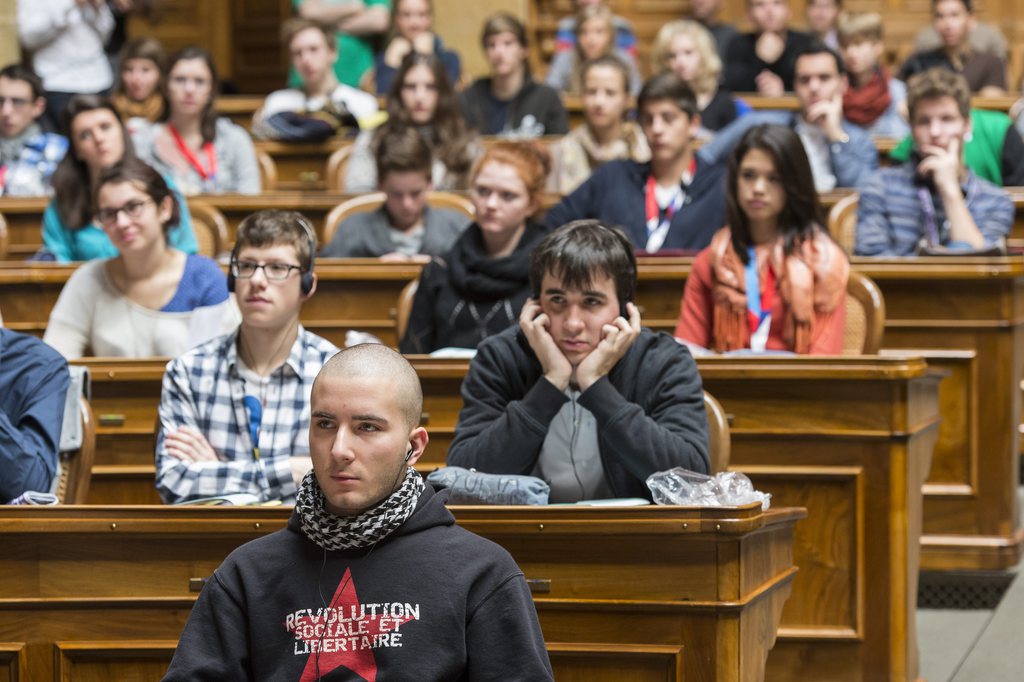Politicians neglect potential of Twitter and Facebook

Six months ahead of October’s elections, social media have not yet made much of a breakthrough among candidates. Few Swiss politicians know how to use these platforms in a professional way for their campaigns, commentators say.
“Compared with what goes on abroad, especially the US, but also France and Italy, we are still far behind,” says Magali Philip, who hosts a programmeExternal link about social networks on Swiss public radio, RTS.
“Looking back to the last elections in 2011, I get the impression that there has been little real progress – in French-speaking Switzerland anyway. There are few candidates who stand out, and no party seems to have a social media strategy worthy of the name.”
Mark Balsiger, a political scientist and author of a handbook on political campaigning, is not quite as critical, at least of the parties. “They now understand the importance of pictures, videos and the point that when discussions start they need to be moderated, and that the response needs to be fast,” he says. “And above all, no one now is in any doubt that these channels need to be used.”
For Sandro Lüscher, creator of a Twitter account on Swiss politicsExternal link and a student of political science at the University of Zurich, “the youth wings of the parties are naturally the most active, but also the Social Democrats, Greens and Christian Democrats have a fairly strong presence on social media. But it’s true that the use of these channels is still quite marginal in Switzerland. The potential is great”.
The politicians’ forays into social media are not always of high quality, either. “The parties are experimenting. Yet we are no longer at a stage where we can just experiment. Whatever gets posted should be properly done. Today social media need to be run by specialists and not by some young person doing it on a voluntary basis,” Philip stresses.
“We are still in the beta phase,” says Balsiger. “Perfection is not the primary thing – what counts is authenticity. Yet if posting is done in a really amateurish way, it may be counter-productive.”
Leaders lacking
It is better just to decide “it’s not my thing” than to use social media against one’s will. “If you’re not that way inclined, you should forget it, because it shouldn’t be faked,” says Philip.
Of the 246 parlamentarians, barely more than 100 are on Twitter. And to find the most recent tweet of some of those you have to look far back.
One reason for this reluctance to make use of social media is perhaps the lack of major players who take the lead, suggests Philip. “There are no models, like [Italian Prime Minister] Matteo Renzi, who is one of the stars of Twitter. Of the seven cabinet ministers, only Alain Berset and Johann Schneider-Ammann are on Twitter.”
Economics Minister Schneider-Ammann, she says, started only recently “and does it in a heavy-handed way. It is strictly for information. Interior Minister Berset is getting a bit more ‘human’, even though all his tweets are carefully worded”.
For Lüscher, another reason for the lack of tweets is to be found in the Swiss electoral system itself. “You get elected in a canton. A Zurich politician has no reason to campaign in French-speaking Switzerland. In other words, election campaigns are geographically restricted. There is no incentive to spread them out over virtual space,” he says.
Golden rules
What advice can be given to politicians who are starting out in social media? Balsiger lists five golden rules for success: be interactive, have a sense of humour, be authentic, post regularly, and be interesting.
“To write a tweet saying ‘tomorrow I will be on such-and-such a square in Bern handing out my campaign leaflets, be sure to be there’ is no use – no one will come.”
For Philip, many politicians have failed to understand that they need to adapt to the codes of social media and cultivate a lighter tone than in their press releases. The light tone does not mean superficiality – “what is posted should have substance”, she says.
The result of the coming elections is not likely to be determined by what the candidates do (or fail to do) on social media. However, a good online strategy may pay off.
“Right now, a tweet can be enough to get you an invitation to be on a radio or TV show. It doesn’t matter if you are already a well-known politician or just a young person starting out. The social media are very important platforms. Twitter especially is used a lot by journalists,” Philip says.
Investing time
Using these new tools effectively means investing time – a lot of time. Of course, time is a scarce commodity for part-time politicians, as those in Switzerland are. But they can confine themselves to posting three or four times a week.
“The important thing is to post regularly,” say Philip and Lüscher.
Entrusting the management of one’s web profile to third parties, for example to public relations agencies, can be a risky proposition.
“These are very personal channels. If communication is done by others and the writing style is different from the politician’s, it may give an impression of falsity,” Balsiger warns.
Six Swiss out of ten use social media
56% of the Swiss population, which translates as 3.2 million users, are active on social media, and half of them connect daily with Facebook, Twitter, YouTube, Flickr, Instagram and similar sites, according to the latest figuresExternal link from the NET-Metrix company.
The proportion rises to 90% in the 14-35 age group; in the 36-54 group it is 65% and for the over-55s it is 40%.
88 Swiss out of 100 use the internet regularly.
Translated from Italian by Terence MacNamee

In compliance with the JTI standards
More: SWI swissinfo.ch certified by the Journalism Trust Initiative





You can find an overview of ongoing debates with our journalists here. Please join us!
If you want to start a conversation about a topic raised in this article or want to report factual errors, email us at english@swissinfo.ch.